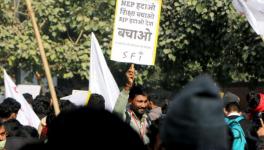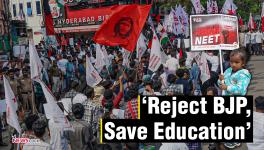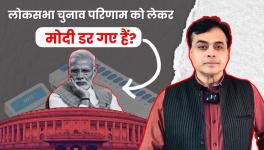Union Budget: FDI and NEP Will Privatise Higher Education
In its manifesto for the 2014 Lok Sabha elections, the Bharatiya Janata Party (BJP) had promised that if it came to power, it would increase public spending on education to 6% of the country’s GDP. The manifesto had said, “Investment in education yields the best dividend. Public spending on education would be raised to 6% of the GDP, and involving the private sector would further enhance this.” However, figures show that this promise is not even close to being fulfilled. Ironically, the Union government’s spending on education as a percentage of GDP has seen a constant decline during the six years of Modi government at the Centre. There was no mention of this promise in BJP’s manifesto for the 2019 Lok Sabha elections.
In the Union budget for the fiscal year 2020-21, Rs 99,311 crore is allocated to the Ministry of Human Resource Development (MHRD), an increase of 4.7% from the previous year. An amount of Rs 39,466 crore is allocated to the Department of Higher Education, an increase of 3% from the previous year, while the Department of School Education and Literacy is allocated Rs 59,845 crore, an increase of 5.85% from the fiscal year 2019-2020.
Talking about education during her budget speech, Finance Minister Nirmala Sitharaman said that the New Education Policy (NEP), that has been opposed by students and teachers across the country, will be announced soon. The Draft National Education Policy (DNEP) notified in June 2019 seeks to cut down the budgetary allocation by the Union government for higher education, and privatise higher education institutes. This process is to be centrally controlled through the Shiksha Aayog. If NEP is implemented, every University or college will have its own Board of Governors that will comprise of hand-picked "public-spirited individuals" and representatives of government and "primary funders", according to the draft. This body will have the power to decide courses to be offered, course-content, number of students and quantum of fees, number of teachers and their qualifications and service conditions, etc. The provision of elected representatives in such statutory bodies is specifically prohibited.
Also read: Under Modi, Cost of Education Has Exploded
Sitharaman added, “It is felt that our education system needs greater inflow of finance to attract talented teachers, innovate and build better labs. Therefore, steps would be taken to enable sourcing External Commercial Borrowings and FDI, so as to be able to deliver higher quality education.” This, too, has been opposed by students and teachers across the country.
Criticising the budgetary allocation for education, Krantikari Yuva Sangathan (KYS) said in a statement, “The funding in the Education Sector is highly insufficient. The marginal increase would be offset by inflation. The biggest worry is the effort to bring in Foreign Direct Investment (FDI) in education which would cause large scale privatisation in the higher education sector and would cause a large section of the country’s marginalised sector to be deprived of education.”
The Students’ Federation of India (SFI) said in a statement released on February 1, “In the last few years, we have seen how this Government left education sector at the mercy of market forces in the name of Graded Autonomy, Autonomous Colleges, HEFA loans, Tripartite MOU, Institutions of Excellence, HECI Bill etc. At all levels, such policies created power imbalances, which only helped this Government to saffronise and communalise the education spaces. Turning Higher Education Institutions into a self-financing model led to jeopardising of service conditions of employees, steep fee-hikes and a crackdown on all democratic spaces.”
Also read: Govt Sits on Education Cess Worth Rs 1.16 Lakh Crore
In an analysis of all the budgets of NDA II government, the Centre for Budget and Governance Accountability (CBGA) pointed out that in the years of Modi government, the education system in India has gone through significant structural changes. As part of the concurrent list in the Constitution of India, education is a joint responsibility of the Centre and state governments. The analysis pointed out, “During the last few years, the Union government has gradually shifted its responsibility to states. The process hastened after the recommendation of the 14th Finance commission (FC).”
It added, “With increased devolution of central taxes from 32% to 42%, states have received more untied resources. On account of this increased funds to states, the share of Union government spending on education in total budget has consistently decreased in the 14th FC period (2015-16 to 2019-20). However, states have responded positively to this change by increasing their share for education. An analysis of state budget for the first three years of 14th FC (2015-16 (Actual) and 2017-18(Budget Estimate)) shows a three percentage point increase in states’ share of expenditure for education.”
Get the latest reports & analysis with people's perspective on Protests, movements & deep analytical videos, discussions of the current affairs in your Telegram app. Subscribe to NewsClick's Telegram channel & get Real-Time updates on stories, as they get published on our website.
























